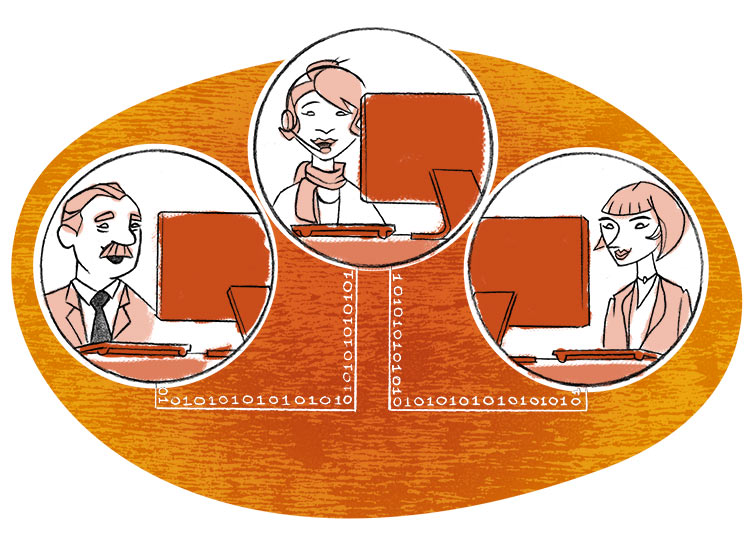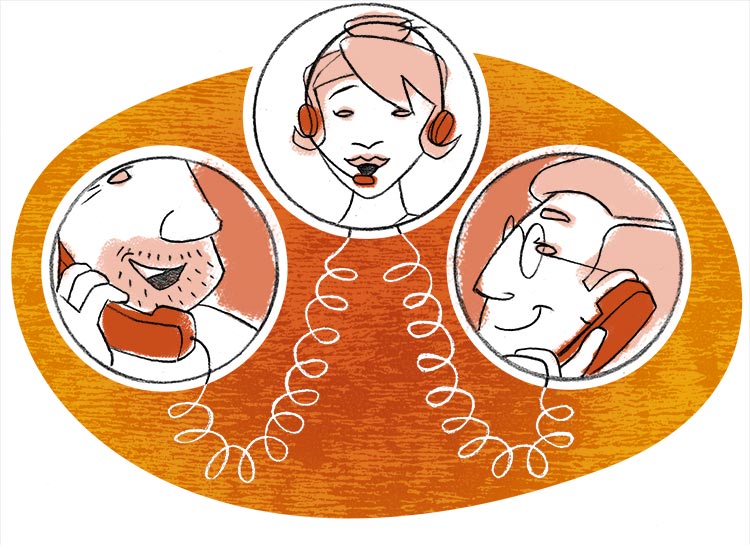The main service I provide is interpreting, which involves orally conveying meaning between speakers of different languages. I specialise in interpreting from my passive language (English) into one of my active languages (German, Russian and Ukrainian). I have been building up my active use of English, and after several years now also offer interpreting into English. I am professionally qualified as an interpreter: I trained to be a conference interpreter at one of Germany’s best interpreter institutes. I have also completed courses of study in countries where my working languages are spoken.
Conference advice
My experience as a senior interpreter means I am ideally qualified to advise my clients on multilingual spoken communication. Whenever more than one language is used formally at an international event, organisers turn to professional language service providers like me. I know exactly what you need in terms of communications: what type of interpreting, how to hire a suitable team and how to provide suitable interpreting equipment. As a consultant interpreter, I provide a clear communication channel between the event organiser and their interpreter team. I can also help you translate written communications in the run-up to your event.


Team organisation
I assemble and book highly skilled, well prepared teams of interpreters for my clients. Having worked in this sector since 1991, I have built up my knowledge, contacts and network of trusted colleagues. I can call on team members with the right specialisms for almost any conference. I adopt the team coordination and management roles, as well as emailing the interpreters beforehand and coordinating them during the assignment (acting as chef d’équipe).
Interpreting equipment
I can partner with a reliable interpreting equipment provider to arrange equipment for your event. While some interpreting scenarios call for soundproof booths in accordance with ISO standards, in others a simple tour guide system is both appropriate and entirely sufficient. If the interpreted output is to be recorded or streamed over the internet, and especially with remote interpreting, it is essential that your conference equipment is reliable and high quality The conference technology therefore forms a major part of the communications package for any media interpreting (which includes broadcasting the output on television or radio, or streaming video or audio over the internet).

More about interpreting
Simultaneous interpreting
Simultaneous is the mainstay of conference interpreting. Two or three interpreters convey the speaker’s message into the target language from a soundproof booth, at almost the same time as the initial speaker’s words (there may be a slight delay depending on the speaker). The interpreters switch round, so each of them only works for 15 to 30 minutes at a time. Professional interpreters determine the length of each ‘turn’ according to factors like the amount of terminology used during that time, how technical the subject matter is, and how quickly the speaker talks. Other factors include how long the interpreters will be working overall and their prior knowledge of the subject matter.
It is possible to spot good quality interpreting, especially if you speak both of the languages involved. The interpreter will reproduce the content of what is said in a compact format, full of meaning, without necessarily adhering to the individual words, syntax or figures of speech of the original. They will speak eloquently and naturally, with appropriate images, using an intonation which you could listen to for hours at a time if you had to. Names, figures and comparisons will all be conveyed. You will notice that, if listeners to the original speaker laugh, listeners to the interpreter’s output also laugh.
An experienced team of professionals will ensure they are guided by these principles. And I know how to set up these teams for various specialist conferences, to prepare for the conference, work with them while there and follow up afterwards.
Consecutive interpreting
Consecutive interpreting takes place in a variety of contexts, but one thing remains the same: the interpreter is physically present. The interpreter sits or stands next to the speaker and conveys the content of their speech after they have spoken. The sections of speech to be interpreted may vary in length, from a single phrase to whole speeches 5-6 minutes long. The interpreter usually records the content of the speech using a specially developed note-taking technique. Over the years, this note-taking technique has been taught to trainee interpreters, expanded, perfected and personalised. Sophisticated note-taking is a trusty tool in the interpreter’s professional armoury. Any such note-taking is underpinned by a well-trained memory, with the interpreter using the notes as prompts.
Interpreters work either alone or in pairs for consecutive interpreting. Depending on the size of the audience, they may use a tour guide system.
It is crucially important with consecutive interpreting that the interpreter adopts a professional attitude, playing a neutral and impartial role. It means that an interpreter will never ‘take sides’, but will instead ensure seamless communication and good comprehension between both languages. Interpreters’ knowledge of the cultures behind these languages helps smooth the path towards mutual understanding. It is part of their job to transfer the cultural content as well as the words themselves, thus conveying the whole message as it was intended.
Chuchotage (whispered interpreting)
Chuchotage is French for ‘whispering’, which describes the mode of delivery for this type of interpreting. Interpreters work simultaneously, ‘whispering’ their words into the listener’s ear or speaking quietly into a tour guide system. If only one or two people need interpretation, the interpreter will sit next to them. If more people need to listen, if the group is moving around or the surroundings are noisy, it is best to use a tour guide system. This enables listeners to move around freely, and interpreters to position themselves as they choose. Since this is most often a form of simultaneous interpreting, whispered interpreters work in pairs. The interpreters switch round every 15 to 30 minutes.
Video Remote Interpreting (VRI)
Most of the assignments I have undertaken using VRI have been for international organisations and for speakers linking up to specialist conferences. VRI is needed where a speaker is not present at the conference venue, but speaking to the audience from a separate location. It can also be used for question-and-answer sessions.
In special cases, the interpreter bears an even greater responsibility: when interpreting for the authorities, for hospitals, the police and emergency services. In these cases, every word is vital and could affect life or death decisions. If an ambulance is needed urgently at a particular location, then every single digit in the address must be interpreted accurately. Therefore, in an emergency, a qualified interpreter called in over VRI can be crucial. If the ambulance attends house number 45, because that is the number the interpreter gave by mistake, then a seriously ill patient waiting at number 54 will be at risk of harm as they wait to go to hospital. That is why I urge anyone hiring an interpreter for such situations to employ only well trained, currently active, well-prepared professional interpreters. One factor which often distinguishes professional interpreters from other types is that professionals have adequate insurance cover for the work they do.

Negotiations
Interpreting for negotiations is normally in consecutive mode. The interpreter sits at the negotiating table and conveys the original (source) language message in the desired (target) language. There is often only one interpreter present. If there are two, the second may be provided by the other party to the negotiations, or they may be a ‘check interpreter’ hired by the same party. The second interpreter monitors their colleague and acts as an expert to monitor the accuracy and validity of their communication. It is rare for both interpreters to work at the same time. In that case, however, each party’s interpreter often only works on interpreting what the other party says to his own party. Of course, the opposite can also be the case: each party may choose to use their own interpreter to interpret their own words to the other party.

Trade fairs
In Frankfurt am Main where I’m based, there is great demand for interpreting at trade fairs – after all, this is one of Germany’s biggest trade fair venues. I work both for Messe Frankfurt and for individual exhibitors. Forums and press conferences normally call for simultaneous interpreting, while work at stands is usually consecutive. Specialist trade fairs can be challenging for an interpreter in terms of terminology. It is therefore a real advantage if your interpreter lives nearby and can work repeatedly at the same trade fair, building up their knowledge each time. The Messe in Frankfurt is very large, and interpreters who know their way round can share the benefit of this local knowledge with their clients. Days spent at trade fairs can be long and bring constant stimulation, including making new business contacts. I can ensure you make the most of them by hiring you experienced, sure-footed interpreter colleagues with whom I have worked for years.

RSI
RSI stands for Remote Simultaneous Interpretation. The new technologies which have enabled globalisation and a fast pace of life have also facilitated RSI. And of course, the current coronavirus crisis makes it all the more necessary as a solution. International organisations and businesses use RSI, and authorities are also beginning to employ it. There is some debate about this method, and the technology is not yet fully mature. Nevertheless, it is becoming established worldwide as an interpreting option.
The interpreting equipment, sound quality and security are particularly important for RSI, and a reliable teleconferencing platform is key. Multilingual communications which work well using remote interpreting through teleconferencing platforms also need a reliable internet connection, preferably with spare bandwidth, in order to ensure the above-mentioned image and sound quality.
Interpreters can work from an office workspace specially set up for RSI, from the client’s conference room, or from an ‘RSI hub’. As the name suggests, RSI usually requires a video connection, although it is also possible to use an audio channel only, for voice-only interpreting. If the information being discussed is sensitive, clients usually prefer the interpreter to be present at their own site. The discussion may be recorded, including the interpreting. Professional interpreters prepare carefully for every RSI assignment. In my case, in order to prepare I like to have information on the context in which I will be deployed, as well as a list of participants and any other background information. The better I can prepare in advance, the better my interpreting will suit your particular context. One advantage of a video connection is that the interpreter can see as well as hear the participants, and may pick up on non-verbal cues to the speaker’s meaning. Videoconferencing solutions such as WebEx have proved suitable for RSI.
Telephone interpreting
Interpreting is often performed over the phone for short calls, as well as being used for business teleconferencing. A conference call is arranged between the interpreter and two or more other people. The interpreter provides consecutive interpreting; normally only audio is used, not video. Telephone interpreting for authorities and other public bodies is often organised with interpreters on standby for particular shifts, able to provide interpreting over the phone during those periods. In the private sector, teleconferences are often arranged and planned in advance, allowing interpreters to prepare accordingly. These may be calls to customers or suppliers abroad, or multinational project team meetings.

Public service interpreting
This covers interpreting for various authorities and in public-sector settings. I offer this service in addition to my core provision. I have relevant skills and received excellent training for the role, having obtained a Diploma in Public Service Interpreting in London. For the Diploma, I was examined in interpreting techniques and on my transparency, impartiality, compliance with professional ethics, and unbiased awareness of cultural issues. Building on these skills, I have gained experience of working with German authorities and administrations. I know the correct specialist vocabulary, both in German and in my other working languages. And importantly, I also have the necessary insurance to cover work in this area.

Interpreting in healthcare settings
I can also offer interpreting within the healthcare system. Deployments in the healthcare require skills and qualifications, but also a knowledge of hospital processes, medicine itself and the relevant specialist terminology – in all the interpreter’s working languages. There is clearly significant potential for legal disputes in the sector, and it is therefore crucial that only qualified interpreters be used. This is in contrast to untrained people, healthcare workers, members of the community or even the patient's friends or relatives. Language professionals must have appropriate professional indemnity insurance cover to work in healthcare. As with other public service interpreting, the relevant interpreting skills include transparency, impartiality and awareness of cultural issues. The duty of confidentiality is an absolute necessity when interpreting for the healthcare sector, as of course is clear communication between doctor and patient at all times.

Court interpreting
Court interpreting is defined by type of location where it takes place. In Germany, this activity is regulated by a Federal law on Payment and Compensation by Judiciary Authorities, JVEG. Both simultaneous and consecutive interpreting can be performed in court, both with and without a tour guide system. Often a single interpreter is used, especially where interpreting is only needed for a short period. Interpreters can deliver whispered interpreting (chuchotage) to a single person, or interpret out loud to the whole court – for example when witnesses are being examined. Court interpreting normally requires an interpreter to be ‘sworn’ or officially authorised for this work. It is always beneficial when interpreters have experience in court, possess a sound knowledge of legal terminology and have the opportunity to prepare for their assignments.

 Українська
Українська  Русский
Русский  English
English  Deutsch
Deutsch 

